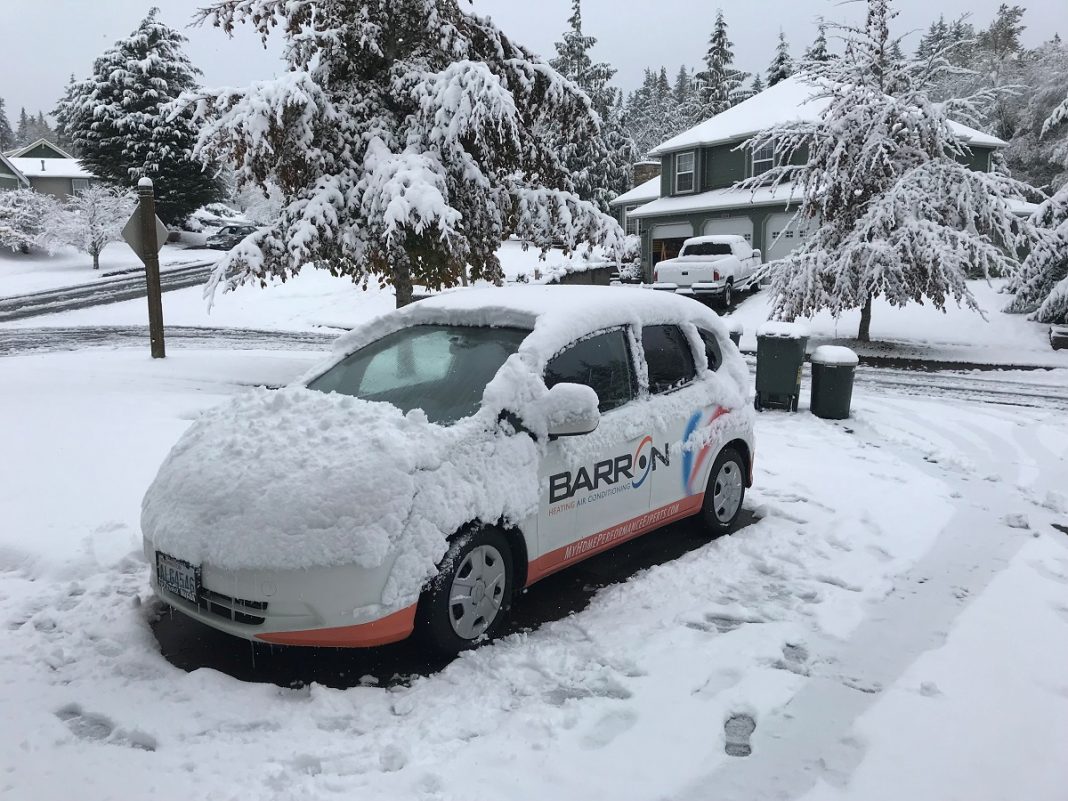Submitted by Barron Heating & Cooling
“My pipes froze! How will my heat pump work? What should I do when…?” With wild winter weather events understandably come a flurry (pun intended!) of questions regarding plumbing, HVAC, and general home maintenance. From keeping your faucets dripping to clearing snow from your heat pump, the experienced team at Barron Heating AC Electrical & Plumbing compiled a series of frequently asked questions that address many of these common sub-freezing-related topics. When the temperature drops, these FAQs are a great first stop for preventing equipment failure or plumbing damage, while also providing steps to follow if you’ve already run into trouble.
Q: How can I help prevent my pipes from freezing?
A: There are a few easy steps that can be taken to reduce the chances of pipes freezing in extended cold weather. Opening the cabinet doors under the sinks in your home is one—this allows warm air to reach the pipes and prevents these areas from getting too cold. Another smart step is to keep your faucets dripping. This allows water to continually move in the pipes, making it much less likely to freeze. And if you have a crawlspace, make sure that vent covers are in place! Plugging vents prevents cold air and especially wind from blowing into the space, keeping the crawlspace above freezing.
Q: If my pipes freeze what should I do?
A: While applying heat is recommended, first and foremost, never use an open flame to try to defrost pipes. After taking all the preventative measures listed above, open your faucets and try to heat the area where the pipes are located. Space heaters can be used to heat the space if it is safe to do so. Heating pads or hair dryers are also a helpful option, as they can be used to directly apply heat to the pipes where they are frozen.
Q: What do I do if a pipe bursts?
A: If a pipe bursts in your home, turn off the main water line. Once the main line is shut off, open all faucets to drain the water out of the system. Leave the faucets open until you can have a professional make the repair and restore water service to your home.
Q: Do my crawlspace conditions play a role in pipes freezing?
A: The condition of your crawlspace can dramatically affect the protection of your water pipes. When the plumbing in your crawlspace is installed between the floor joists, for example, it should be properly surrounded by insulation. If that insulation is insufficient or damaged, it can lead to frozen pipes.
Q: How will my heat pump work when temperatures are below 30° F?
A: The answer to this question is heavily dependent on what type of heat pump you have in your home. Heat pumps are an exceptionally efficient way to heat and cool in moderate climates like the Pacific Northwest. But in extreme temperatures like we are experiencing this winter, it can be challenging for heat pumps to keep up with the heating demands of your home. This is especially true if your house is lacking insulation or air sealing. If you have a central air system with a heat pump, there is generally some sort of backup heat, whether it’s natural gas, propane, or electric. These systems sense the outside temperature and adjust to the most efficient and effective heating process. When it becomes cold enough to warrant a switch, the backup heat source will either take over or supplement your heat pump. We recommend setting temperature and keeping constant throughout the cold spell. It is more efficient and easier for the heat pump to maintain then to have to catch up.
If you have a mini-split heat pump, we recommend following the “set it and forget it” philosophy. The thermostat should be set and left at the temperature you are comfortable as the remote is not the sensing device. When the outside temperature drops below the rated temperature of the unit, the system will continue running, but at a decreased output. Supplemental heat sources like a fireplace, electric heaters, or radiant heat are great ways to complement a mini-split system.
Q: What do I do if the condensate on my furnace freezes?
A: Condensate is a byproduct of the high efficiency heating process that needs to be expelled (or drained) for your furnace to function properly. Condensate is most often drained to the exterior, but in cases of extreme cold, that drain can become frozen and blocked.
If the condensate line becomes frozen, warming the piping with a hair dryer or heat gun can melt the blockage and allow for the condensate to flow. It is important to note that condensate is acidic, however, and should not come in contact with skin.
To reduce the chances of your condensate line refreezing, the exterior portion of the PVC piping can be insulated with weatherproof materials. Ice melt can also be spread underneath the drain line exit point to prevent ice from building up on the ground.
Q: How should I take care of my heat pump outdoor unit in cold temperatures?
A: Any snow or other debris that may restrict airflow should be cleared. Beyond that, the heat pump outdoor unit should not need further attention. Never put anything inside of the unit, as it can damage the equipment.
Pacific Northwest winters are typically mild, but every so often, mother nature throws us all for a loop. From extreme high temps to extreme lows, flooding, and snow, Barron Heating AC Electrical & Plumbing strives to be a team of knowledge and support that this community can rely on. With unprecedented demand for equipment, labor, and weather, we’re prioritizing our customers in an effort to provide the quality service we’re known for. Thank you for your patience as we navigate this final chapter of 2021 together—it’s keeping us all on our (frostbitten) toes!




































